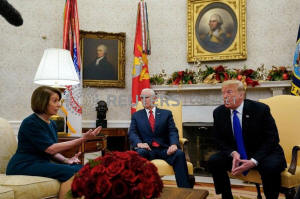|
Trump postponement is latest twist in
changeable State of the Union
 Send a link to a friend
Send a link to a friend
 [January 25, 2019]
By Amanda Becker [January 25, 2019]
By Amanda Becker
WASHINGTON (Reuters) - This week's fight
between U.S. President Donald Trump and House of Representatives Speaker
Nancy Pelosi over his State of the Union speech was unusual - but the
resulting postponement was not.
The presidential address is an annual rite in U.S. politics that often
changes and has been delayed before, although the Trump-Pelosi spat may
have led to the first postponement initiated by someone other than the
president.
Trump said late on Wednesday that he would delay his address, which had
been slated for Jan. 29. His announcement came after Pelosi disinvited
him from appearing in the House, which she controls, suggesting he delay
the speech until after a partial federal government shutdown has ended,
or deliver it in writing.
Trump acknowledged it was Pelosi's "prerogative" to cancel and said he
would wait.
Donna Hoffman, a political science professor at the University of
Northern Iowa and an expert on State of the Union addresses, said the
Trump-Pelosi spat was "unprecedented, but not a travesty" because the
address's history is varied.

The U.S. Constitution says that presidents "shall from time to time give
to the Congress information of the State of the Union." But the nation's
supreme law spells out no more details.
President George Washington gave the first Annual Message to Congress in
1790, appearing before the legislature. President Thomas Jefferson
stopped doing in-person addresses in 1801 and submitted his message in
writing.
In 1913, President Woodrow Wilson revived the speech tradition and
expanded its scope to include setting a policy agenda, according to a
Congressional Research Service report.
[to top of second column]
|

U.S. House Speaker designate Nancy Pelosi (D-CA) speaks with Vice
President Mike Pence and U.S. President Donald Trump as they meet
with her and Senate Minority Leader Chuck Schumer (D-NY) in the Oval
Office of the White House in Washington, U.S., December 11, 2018.
REUTERS/Kevin Lamarque

President Lyndon Johnson in 1965 changed the time of his address
from the traditional midafternoon to 9:00 p.m. EST in order to
capture a prime-time television audience, the report said.
President Ronald Reagan delayed his 1986 speech until a month after
the Jan. 28 Challenger space shuttle disaster, Hoffman said.
One unchanging aspect of the current arrangements, Hoffman said, is
that "anytime the president wants to address a joint session (of
Congress) ... the president must be invited because Congress is a
separate and independent branch of government."
"Only tradition says he has to give one this year at all," Hoffman
said of Trump. "But, the speech offers an opportunity for the
president to be the center of attention and to present his agenda,
claim credit for accomplishments, and frame events in any way he
chooses. That is a large opportunity."
Pelosi said Trump can give his speech once the partial government
shutdown, in its 34th day on Thursday, ends. Trump wrote on Twitter
on Wednesday that he looked forward to "giving a 'great' State of
the Union Address in the near future!"
(Reporting by Amanda Becker; Editing by Kevin Drawbaugh and Jonathan
Oatis)
[© 2019 Thomson Reuters. All rights
reserved.]
Copyright 2019 Reuters. All rights reserved. This material may not be published,
broadcast, rewritten or redistributed.
Thompson Reuters is solely responsible for this content. |